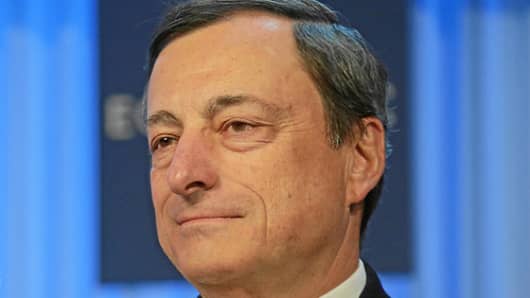Record high unemployment and falling inflation mean the European Central Bank (ECB) has scope to lower interest rates still further in order to weaken the spiraling euro, ING Senior Economist Carsten Brzeski said.
"Past experience has shown the ECB hardly reacts to exchange rate movements… However, if the current trend continues and the euro further weakness the economic outlook, the door for a rate cut could be opened again," said Brussels-based Brzeski.
The ECB will report its latest monetary policy decisions on Thursday, and is widely expected to keep interest rates on hold at a record-low 0.75 percent. In a Reuters survey of 75 economists last week, none predicted a rate cut.
"Markets continue to overestimate the ECB's willingness to cut rates that are already at rock bottom levels, including if the euro goes up another few big figures, or Eonia creeps higher, barring any significant drop of economic forecast into negative territory," Sassan Ghahramani, chief executive of U.S.-based SGH Macro Advisors, told Reuters .
The euro reached a 14-month peak against the dollar and a 30-month high against the yen last week, reflecting loose monetary policy by both the Federal Reserve and the Bank of Japan, and intensifying fears that a strengthen currency could dampen the prospects of an export-led recovery in the euro zone.
Since its last trough in the summer of 2012, the euro has gained more than 11 percent, and compared with the 2012 average, the euro-dollar exchange rate trades 5.5 percent higher.
"A rapid improvement in financial conditions and a less dovish than expected ECB have led to the euro being the strongest major currency in 2013 so far," said Barclays analysts Raghav Subbarao and Guillermo Felices in a note.
However, Brzeski estimates the appreciation in the euro has so far cost the euro zone between 0.1 percent and 0.3 percent points of growth in 2013.
"Fear is that the stronger euro could hit the euro zone periphery and undermine the recent reform efforts. Indeed, exports have become an important source of growth in many peripheral countries," said Brzeski in a note from Tuesday.
Exports have grown by seven percent year-on-year each quarter in Spain, Italy and Portugal over the last few years, according to Brzeski, while Ireland has seen growth of around five percent.
Meanwhile,"core" European countries have re-orientated their export sectors towards non-euro zone countries, making a euro strengthening potentially even more significant.
According to Brzeski, German exports to other euro zone countries have fallen from 45 percent to roughly 33 percent of all exports over the last few years.
"Intuitively,the size of the export sector and its orientation towards non-euro zone countries would make the German economy the predestined first victim of a stronger euro," wrote Brzeski.
On Tuesday, French President Francois Hollande called for a medium-term exchange rate target, echoing concerns from other euro zone countries that the rising euro could dampen the prospects of an export-led recovery.
However, other countries in the euro zone, notably Germany, oppose any intervention in the currency markets.
"Direct interventions in the foreign exchange market should be unlikely. The ECB normally follows the policy that foreign exchange interventions against market sentiment are bound to fail and takes the exchange rate a given," said Brzeski.
Failing a rate cut, strategists said Draghi had more subtle methods he might employ to dampen the euro.
"Trichet stopped an appreciation of the euro exchange rate in 2004 by calling it 'brutal'. It will be interesting to see which code words Draghi can deliver,"Brzeski said.
Or as Valentin Marinov, head of European G10 foreign exchange strategy at Citi, told Reuters on Tuesday: "Draghi will likely refrain from explicitly talking down the euro, but he might try to tone down his outlook for euro zone growth and inflation."
- By CNBC's Katy Barnato



